Key takeaways:
- Emotional eating stems from triggers like stress, loneliness, and past experiences, affecting both physical and mental health.
- To break the cycle of emotional eating, awareness of triggers and mindful eating practices, such as keeping a food diary and savoring meals, are essential.
- Establishing a support system, setting realistic goals, and practicing self-compassion are crucial for long-term success in overcoming emotional eating.
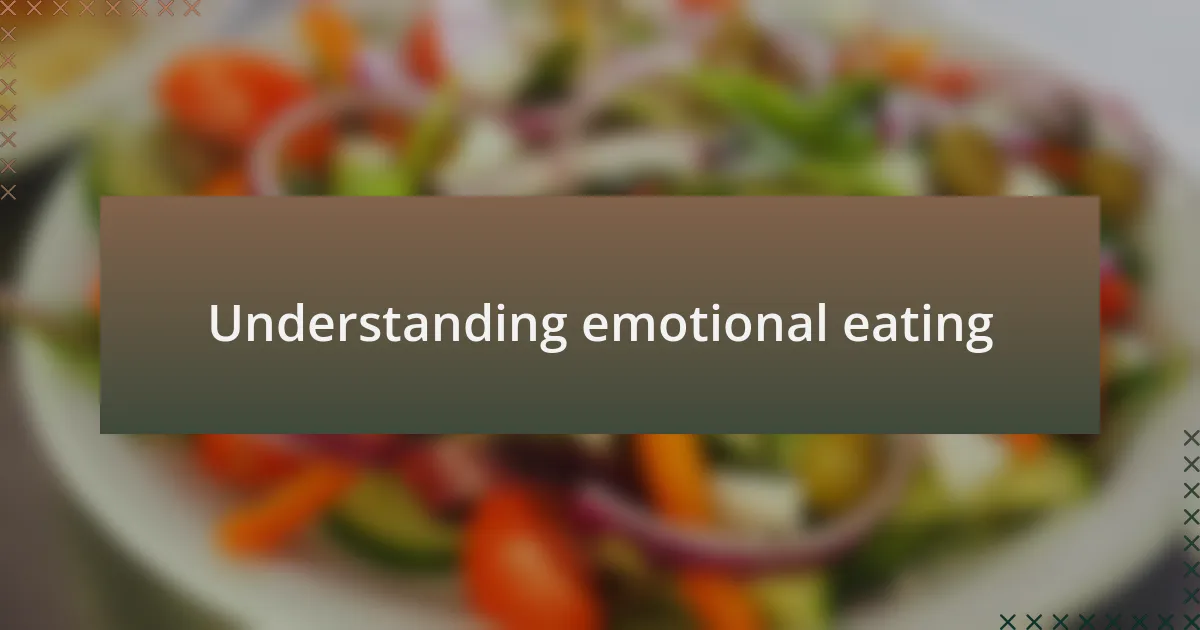
Understanding emotional eating
Emotional eating occurs when we turn to food for comfort rather than hunger, often driven by stress, sadness, or even boredom. I remember a particularly tough week at work where, instead of processing my feelings, I found myself binge-watching my favorite show with a mountain of snacks by my side. It made me wonder, have you ever reached for a bag of chips after a long day simply to feel better?
Many people don’t realize that emotional eating can stem from deep-seated issues or triggers that we might not be fully aware of. For me, it was often tied to feelings of inadequacy or loneliness, making indulgent meals my go-to remedy in emotional distress. Do you recognize any specific situations in your life where food replaced a conversation or a much-needed hug?
Understanding the roots of emotional eating is crucial for breaking the cycle. It involves recognizing those triggers and being mindful of our choices, which can be a tough journey. I recall the moment I started journaling my feelings – it was a game changer. What if, instead of reaching for a snack, I reached for a pen to express what I was going through?
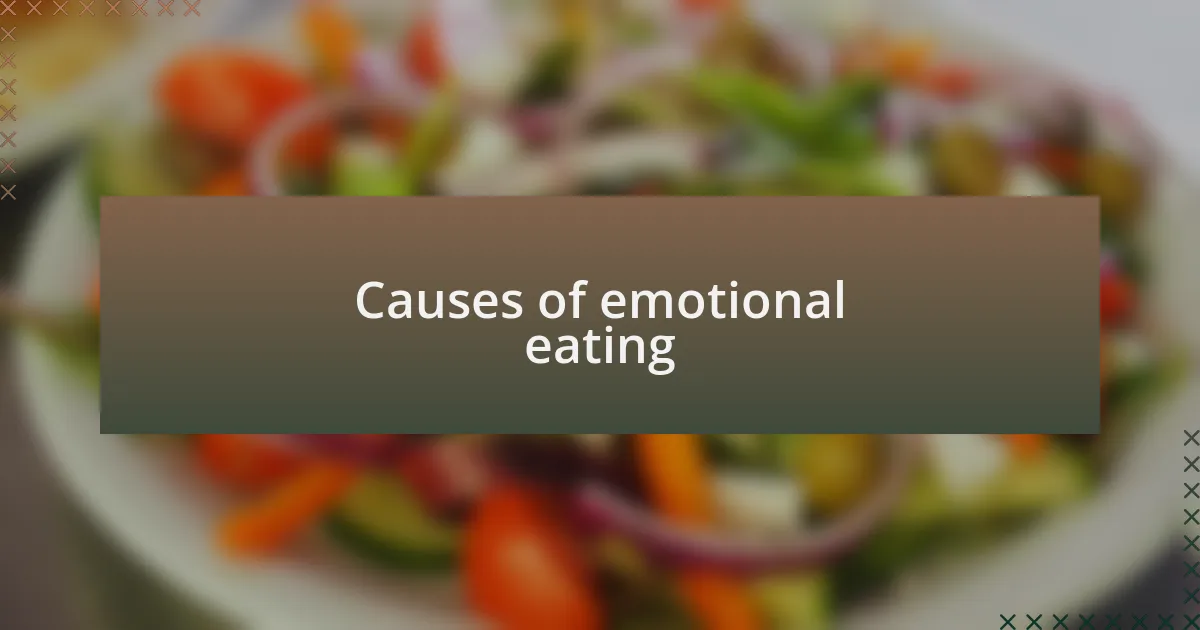
Causes of emotional eating
Many times, our emotional eating habits can be traced back to stress and anxiety. I vividly remember a period of relentless deadlines when I began munching on cookies not for hunger but to cope with the pressure. Have you ever found yourself reaching for snacks during a stressful moment instead of focusing on what’s truly bothering you?
Loneliness can also play a significant role in emotional eating. There were evenings when I felt the weight of solitude, and instead of reaching out to friends, I sought comfort in a bowl of ice cream. It made me think: does food sometimes feel like the only companion that understands our feelings?
Additionally, past experiences can shape our relationship with food. For instance, I grew up in a household where emotional celebrations revolved around big family meals. This connection between food and feelings felt normal until I realized it was influencing my adult eating habits. Can you identify any family traditions in your past that made food synonymous with comfort? Recognizing these patterns is the first step toward understanding our emotional eating triggers.
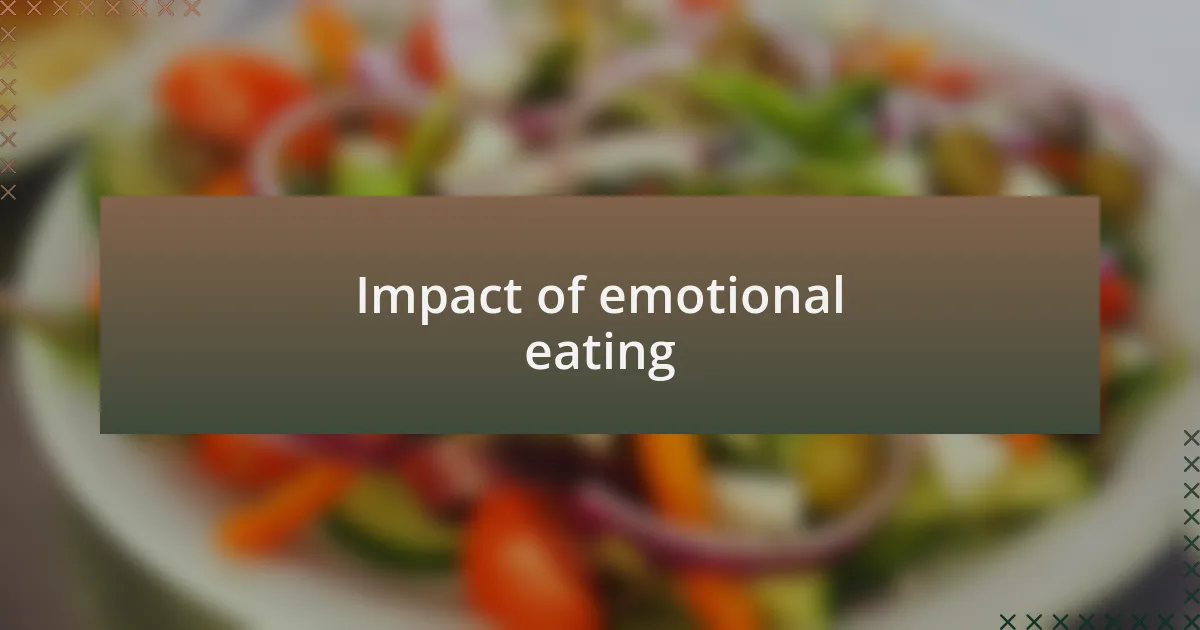
Impact of emotional eating
Emotional eating can profoundly affect our physical and mental health. When I found myself reaching for snacks during moments of sadness or stress, I noticed not just weight gain, but a cycle of guilt and shame that followed each binge. Isn’t it interesting how food, which is meant to nourish us, can sometimes lead us to feel worse about ourselves?
The way emotional eating manifests can also influence our relationships. I recall a dinner with friends where I ignored the conversation, consumed by my thoughts of losing control over my snacking habits. This not only affected my enjoyment of the moment but also created a wall between me and those I cared about. Have you ever found yourself absent even in the company of others because of your food choices?
Moreover, I’ve noticed that emotional eating can distort our perception of hunger. Instead of listening to my body’s signals, I started confusing anxiety with appetite, leading to a cycle where I rarely felt satisfied, no matter how much I ate. This realization made me question: what if we could learn to recognize emotional cravings as signals rather than appetites? Embracing this perspective could be a game changer on the path to healthier habits.
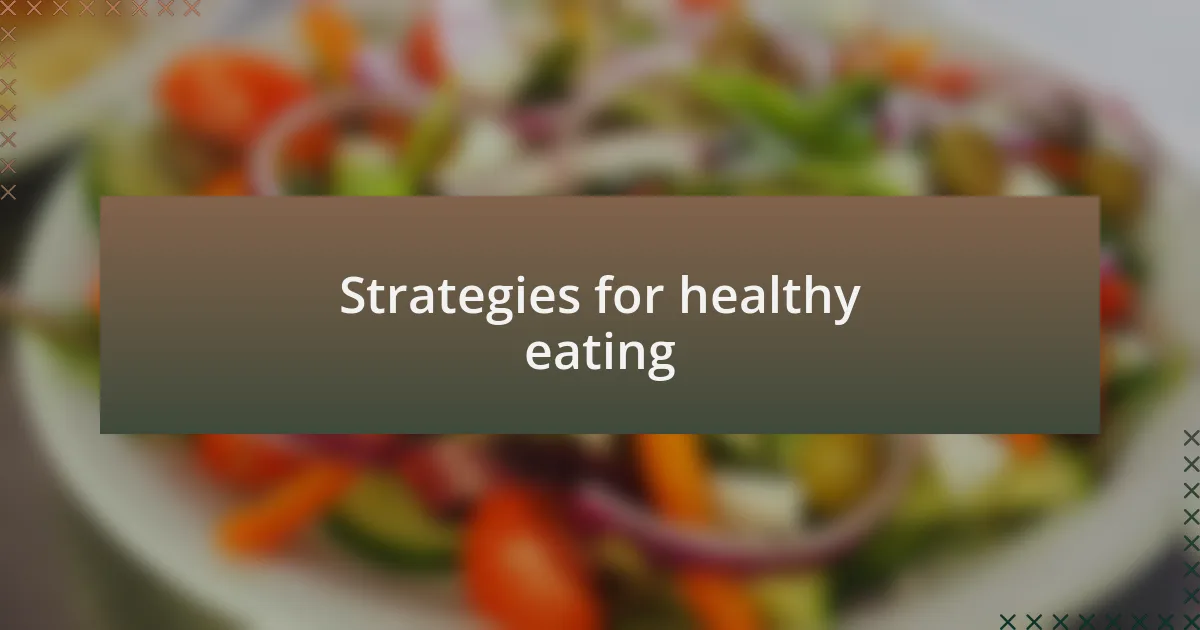
Strategies for healthy eating
Fostering healthy eating habits requires a keen awareness of our emotional triggers. I discovered that keeping a food diary helped me reflect on what I was eating and why. This practice allowed me to pinpoint patterns in my emotional eating, like reaching for chips when I was bored. Have you ever considered how simply writing down your feelings alongside your meals could reveal surprising insights?
Another effective strategy I implemented was redefining my relationship with food. Instead of using it as a remedy for stress, I started focusing on nourishing my body. Preparing colorful meals with fresh ingredients not only made eating enjoyable but also shifted my mindset towards viewing food as fuel rather than a source of comfort. What if you could shift your thoughts on food from indulgence to nourishment?
Mindful eating became a game changer for me, allowing me to cultivate a deeper connection with my meals. By taking the time to truly savor each bite and appreciate the flavors, I began to feel more satisfied with smaller portions. I found myself asking: how often do we rush through meals without realizing how they’re affecting our state of mind? Slowing down transformed my eating experience and empowered me to make conscious choices.
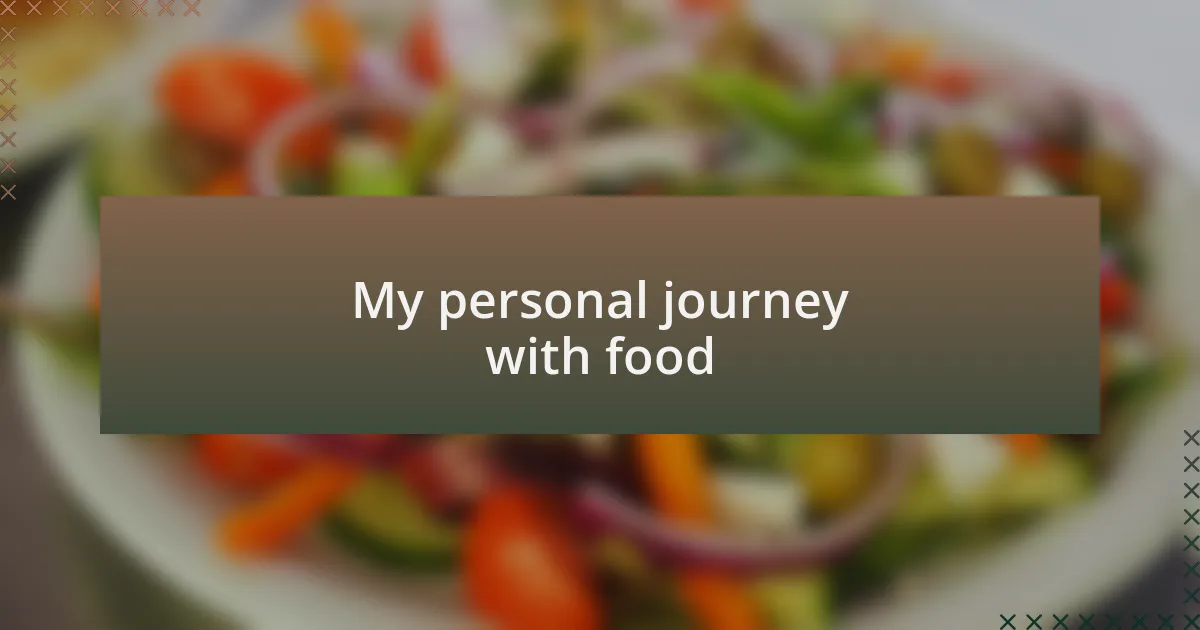
My personal journey with food
Throughout my life, food played a complex role in my emotions. I remember evenings when I would sit on the couch with a pint of ice cream, seeking comfort after a tough day, thinking it was the only thing that understood me. Those moments felt soothing at the time, yet deep down, I recognized that this wasn’t a sustainable solution.
I gradually began to unearth the connection between my moods and my eating habits. One day, as I sorted through some old photos, I stumbled upon a picture of myself at a birthday party, surrounded by friends, but my eyes were glued to the cake. It hit me then: I wasn’t just craving sweets; I was actually craving connection and joy. This realization spurred me to reflect on the underlying reasons behind my cravings. Have you ever felt a pull towards food that seemed more emotional than physical?
As I shifted my focus to healthier eating, I started experimenting with cooking, discovering the joys of preparing meals that honored my body. I recall a Saturday afternoon where I lost myself in the process of chopping vegetables, the colors vibrant and inviting. It felt less like a chore and more like an act of self-care. By embracing this new approach, I learned to celebrate food for its potential to nourish and energize, rather than simply for momentary comfort.
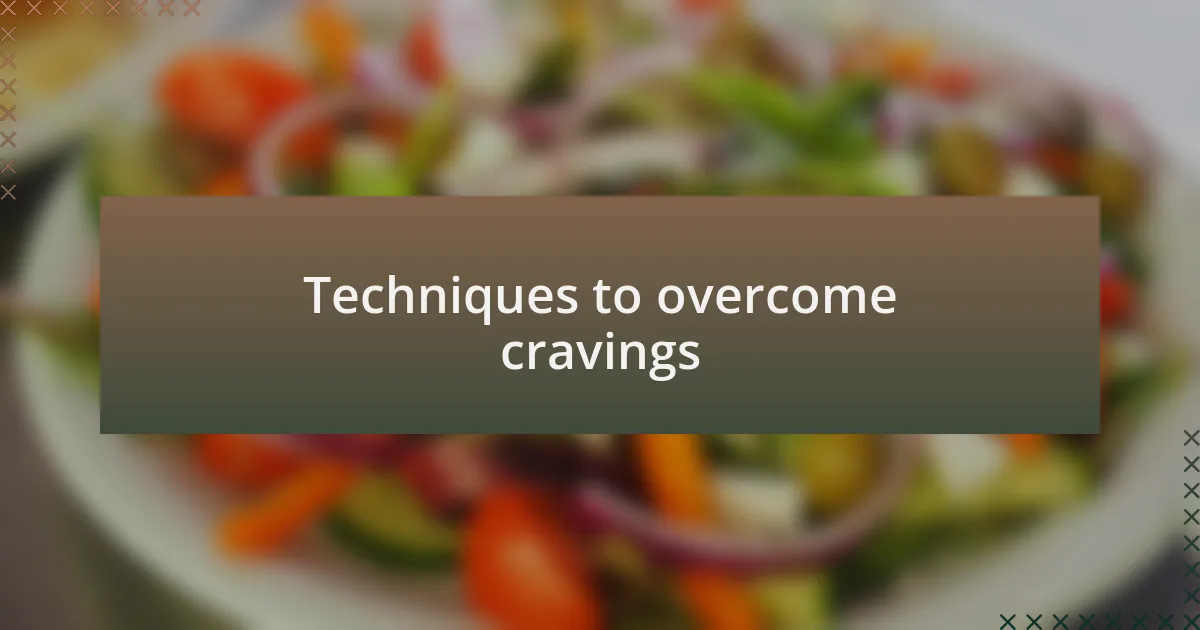
Techniques to overcome cravings
When cravings hit, I found that taking a moment to breathe deeply made a world of difference. Instead of immediately reaching for a snack, I would pause and ask myself what I was really feeling. Was I bored? Stressed? This simple act of mindfulness helped me understand that often, my cravings were more about my emotions than hunger.
I also created a list of alternative activities to indulge in when cravings struck. For instance, I keep a journal nearby, ready to spill my thoughts onto the page instead of into a bowl of chips. Once, during a particularly tough week, I went for a long walk instead of raiding the pantry. The fresh air and movement lifted my spirits, steering me away from that impulsive eating I was trying to avoid.
Another technique that worked wonders for me was keeping healthy snacks readily available. One day, I prepared a colorful fruit salad and put it in the fridge for quick access. Whenever I felt the urge to snack, I could grab a handful of berries instead of diving into less healthy options. It turned out to be a sweet, satisfying choice, reminding me that making small changes can lead to big victories over cravings.
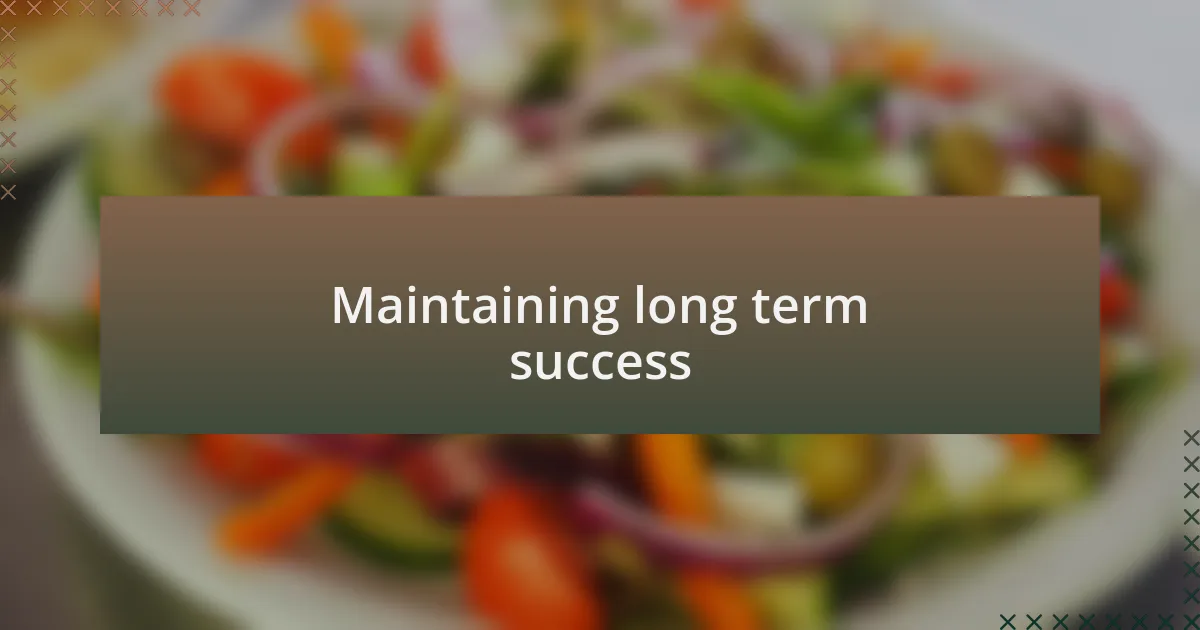
Maintaining long term success
Maintaining long-term success in overcoming emotional eating requires a solid support system. I found that sharing my journey with friends and family not only held me accountable but also provided me with encouragement on tough days. Have you ever noticed how a simple conversation can uplift your spirits? Speaking about my challenges and victories allowed me to connect with others who had similar struggles, reinforcing the idea that I wasn’t alone in this fight.
Another crucial aspect for me was setting realistic goals. Initially, I aimed for perfection, but I quickly learned that sustainability is key. When I adjusted my expectations and celebrated the small victories—like choosing a healthier option over junk food—I felt a renewed sense of motivation. It’s as if each positive choice was a building block toward my long-term success, making the overall journey much more rewarding.
Lastly, I discovered the importance of self-compassion. There were days when I stumbled and reverted to old habits, but rather than beating myself up, I embraced those moments as part of the learning process. How many times do we allow ourselves to wallow in guilt instead of recognizing that setbacks can be stepping stones? By treating myself with kindness and understanding, I became more resilient and better equipped to handle future challenges.